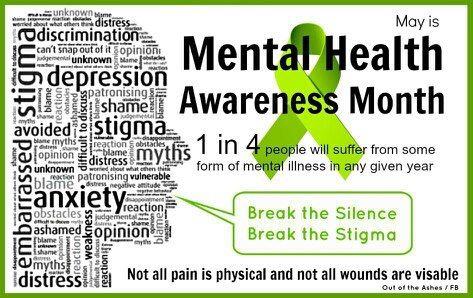National Mental Health Awareness Month- Mental Health before and after COVID
Sometimes one wakes up at 4am and cannot go back to sleep. Sometimes one needs a break every so often throughout a workday. Sometimes one can experience a myriad of emotions in a span of twenty-four hours from happiness, to worry, fear, insecurity, anger, loneliness, self-doubt, etc. Sometimes it is okay not to be okay.

May is National Mental Health Awareness Month. According to the National Alliance on Mental Alliance (NAMI) website, “During May, NAMI joins the national movement to raise awareness about mental health. Each year, we fight stigma, provide support, educate the public, and advocate for policies that support people with mental illness and their families. For 2021’s Mental Health Awareness Month, NAMI will continue to amplify the message of ‘You Are Not Alone.’ We will use this time to focus on the healing value of connecting in safe ways, prioritizing mental health, and acknowledging that it’s okay to not be okay through NAMI’s blog, personal stories, videos, digital toolkits, social media engagements and national events.”

As states slowly begin to reopen, and mask mandates begin to be lifted, life as it once was prior to March 2020 seems to be just over the horizon. But that doesn’t negate the psychological impact the pandemic will have after a year and a half of isolation, tension, anxiety, and fear of the unknown. Fear and isolation magnify feelings and thoughts of anxiety and loneliness. Mix that with a life-threatening disease, an eruption of racial consciousness, and the by-products of a forever changed economy and education system.
Writer Peter Ramjug, in his 2021 article for “News @ Northeastern”, How Is COVID-19 Affecting People’s Mental Health, “since the researchers began conducting regular surveys of U.S. residents about the COVID-19 pandemic in April 2020, respondents have indicated no improvement in the prevalence of sleepless nights, depression, anxiety, and suicidal thoughts. About 28 percent of the 22,000 U.S. residents surveyed reported levels of depression that would typically require professional treatment.” There is no doubt everyone and anyone will be forever changed by the events brought on by the COVID-19 coronavirus pandemic.

Mental illness knows no race, no gender, no sexual orientation, no socioeconomic status, etc. Maintaining one’s mental health is a job in its own and requires deliberate planning and management. But in the aftermath of the pandemic, the stigma surrounding mental illness is slowly becoming lifted by conversations about awareness and treatment.
For more information regarding mental illness resources, visit www.nami.org





